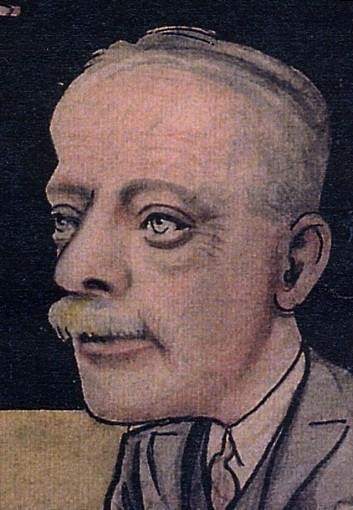Part Two
By Arthur Woodgate
There is a strong belief that all Rye Mayors have been members of the council but this is not true. They must be chosen by Rye Council from Rye ratepayers and, of course, the chosen person must agree to take the position.
Such was the case with Edward Frederick Benson, the great author and resident of Lamb House, who wrote novels based on Rye which he called Tilling. There had been Mayors so appointed in years gone, back far out of reach of my memory. I can’t remember any other Mayor who was not one of the elected councillors in my time.
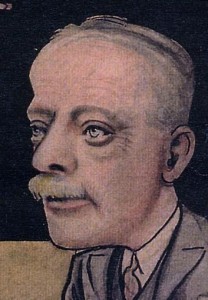
It was an honour to the town to have a famous person as Mayor and as our town may soon have some real power restored (if Area Committees are introduced to split Rother District Council into three) new Rye Mayors may enjoy some of the real potential to change Rye for the better that were available in the Borough Council days of Edward Benson’s three year term of office. In those days Rye’s Mayor and Councillors really did make a difference to the town with greater representative power to help its citizens within the local authority framework.
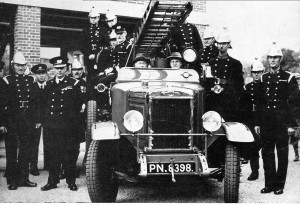
Mayor Benson used a stick and I can remember seeing him leaning on it as he stood in the high street watching people as they walked along each way and up from Market Road. He was no doubt watching to form characters of his books and in “Mapp and Lucia” I could see the result of this, he was a generous man and looked after many things in the town. He gave a new stained glass window to the church and it serves as a memory of members of his family.
Percy Jacomb-Hood was the illustrator of some of Benson’s books, and his wife, Reta, became Mayoress at Benson’s request as he was a single man. She lived in West Street, close to Lamb House where Benson resided. Lamb House has held many members of the very literate Lamb family, hence its name. Where the Lambs went I don’t know but their house became occupied by Henry James, another famous international author, who for many years went to and from America and Rye. Then another author, Rumour Godden, who wrote stories of Romney Marsh lived there, followed by our Mayor E. F. Benson whose books are known all over the world.
So we had a clever but quiet mayor for the three years 1934,35 and 36. I must say ‘Good Luck’ to the Tilling Society who do such a good job in keeping the Benson name alive.
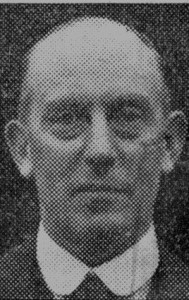
George Marson, who was an elected councillor’ took over as Mayor in November 1937 for three years but he didn’t quite finish his term of office in 1940. He just disappeared saying he had been called away on Government duties leaving his deputy Joseph Cooper to take over. He didn’t say a word to those who had elected him, not why he left or where he went. I don’t know where he came from nor what he did for a living and when asked these sort of questions during his election canvas, he just said. I’m a gentleman and he even had it on his leaflets. A mystery man he certainly was. I don’t know of anyone that knows what really happened to him. Did he run away from the expected German invasion or was he called by the government to do secret work in Whitehall? Rumours abounded. It does not matter now, only for curiosity, but at the time, when I saw retreating troops coming through Rye Station by the train load, at any time it might have been a load of Germans on the next train. Joe Cooper would have had to face them and we all knew Hitler’s plans for town officials.
The Germans did not come. George Marsden resigned in a letter to the council, part of which was made public, citing ‘government work’ as his reason for having to resign. Joe became the mayor in his own right in mid 1940. He proved to be a good and solid Mayor for the first half of World War Two.
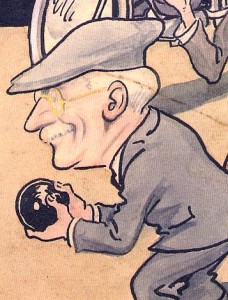
Mayor Alderman Joseph Cooper was an extremely busy man. He had a shop in Rye and as Mayor of the Borough Council and a member of the East Sussex County Council. I seem to think he was routing away for the general interest of our little but important town that stood ‘on the front line’ in those war torn years. I often wonder how he ever found the time to serve his own interests. It was pleasing that after the War he was invited to do another year as a ‘peacetime’ Mayor of Rye and a street was named after him by the town he had worked so enthusiastically for in those dark days of 1940, 41 and 42.
This seems to be favourite area for high ranking service officers to retire to and so it was that for the rest of the War years we found ourselves with General Edward Gurth Wace as our Mayor. As he was getting near the end of his three years in 1945 thing were looking better and the trades unions were increasing in activity. Through the Trades Council, an appointment was made for me to meet the Mayor to explain our thoughts on the treatment of workmen coming home and who already had returned to civilian life. Before I put any points to him I though I had better explain the Trade Union movement and where the Trades Council fits in as he had been a career soldier. I was surprised when he stopped me and said he had read everything there was about the unions, so we discussed why I was there and he let me know he was with us. Although he finished being Mayor, he remained a member of the council, and was replaced by the return of Joe Cooper for another year.
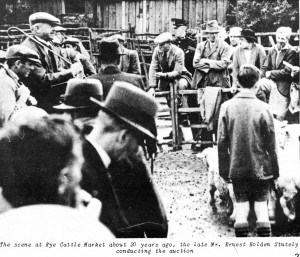
In my young days I can remember Ernest Holden Stutely the Auctioneer. When he was selling sheep it was worth finding the time to visit Rye Cattle Market on a Wednesday to see him performing. He would be standing on the gates round the penned sheep with a clipboard in his hand and not only asking the surrounding farmers for bids, but telling, like a stand up comedian. what they ought to be bidding. When the Methodists held their harvest festivals, he voluntarily came on the Monday and sold the produce of the Chapel Festival and a while after he did the same for the Sunday School and as well as getting the maximum for the funds, he was a good comedy act. I don’t seem to remember his election to the council but he was made Mayor in 1946 until 1948. I couldn’t get to visit the council in those days but I bet his control of the councillors contained a certain amount of humour. His outside speeches did. So, as a Rye resident, I was pleased to see a serious, although light hearted person, representing us. Wish he was here now to laugh some power back to where it belongs.
One might wonder why Rye had so many grocers, but some of them supplied the shipping, so in the mid 30s. we find F Jarrett and H O Schofield with substantial sized grocery shops at 92 and 97 High Street, and there were others around the town. Schofield had recently taken over Vennells and in 1949 Harry Oswald Schofield was asked to be Mayor for the last year of the 1940s and he agreed just for the one year. I don’t remember how any one heading a big business can devote so much time in our interests but they often do, so our thanks to the local shopkeepers, although many have retired. I don’t remember anything spectacular happening during that year.
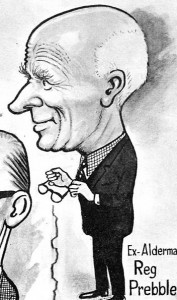
The ‘50’s started with a Mayor no less busy than councillor Schofield. Councillor Reginald Alfred Prebble was Mayor for 1950 and 51. He was an estate agent, and an agent for insurance companies and financial business with an office in the High Street and a home in Cadborough Cliff.
Council Tenants and had been complaining that the fencing around their houses and gardens were not good enough to keep out dogs. As I was still a representative of the Trades Council, an appointment was made for me to meet Mayor Prebble. Off I went and met him at his office where I put the point of the complaint of the ordinary citizens that dogs could get in and spoil their flowers. I saw his face begin to break into a broad smile. “Rubbish” he said and then continued. “I have no fences round my property at Cadborough Cliff”. He invited me to go and look, this I did and found a beautiful stocked garden level with the street pavement and no sign of any sort of fence anywhere, or ever had been. I was beaten by Mayor Prebble, nor could any of my Committee think of an answer to my own opinion that more damage was done by wild animals. I have heard the bark of a fox in my own ground at night and seen where the old badger had stuck his snout to get leather jackets so we didn’t follow that up but left Mayor Prebble in peace I think he had a peaceful two years.
IDavid Arnold Candler came from Hothfield, Kent to act as a general foreman for the Rye Builders, Breeds and Sons, and took up lodgings in Wish Street and later married his landlady, who was a school teacher in the Lion Street Girls School. He took a great interest in Rye. He became voluntary secretary of the bowls club and worked hard at improving the greens he stood for the council and got in with a big majority. In 1952 he was made Mayor a post he held for two years. The Mayor of Rye is always a Baron of the Cinque Ports and as such attends Coronations. In 1953, we St John members were asked to send 20 members from Rye to make some of the 2,000 first-aiders needed for duties at the Coronation of Elizabeth II. A special train, stopped at Rye at 3am to pick up the Mayor and everyone else from Rye attending on duty for that great occasion. We were out on our stands at 8am. in the Admiralty Arch area. Where the Mayor went after he left us I don’t know but he turned up in the mad crush on Charring Cross railway station where we eventual got in a train that brought us all back home to Rye soaked to the skin, as it rained hard all day. Mayor Candler was no longer working in construction by the time he became Mayor, back in 1932 W. E Breeds and Sons had secured the contract to build the first Regent Cinema and had brought in another man to be general foreman and reduced Dave Candler to an ordinary craftsman. He was instructed to work on the Cinema under the new man, he saw this as an insult and I was there when he walked out in a very angry mood. He then bought a retail business at the top of the mint, so when he became Mayor he was selling tobacco and umbrellas and walking sticks, he was known as one of Rye’s many loyal shopkeepers and was a councillor for quite a while.
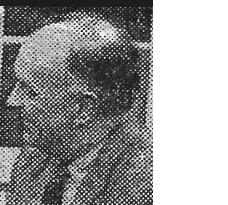
A new school was built behind the Queen Adalaide pub in 1936 and school master Maurice Beevers was given the job of Headmaster. It so happened that a sister of my wife had a new baby and as she was having a bad time with a terror of a young son (Junior School age) my wife agreed to have him for a while and as he had lived in Southend he had to change schools and was sent to Maurice William Beevers’ School. Maurice Beevers became our Mayor for 1954-55. Our little charge began to get less ignorant, but he would still difficult. As the time went for him to go home Maurice Beevers wrote to us praising us for his improved behaviour, the Mayor had helped though but our efforts didn’t last, his parents let him drift again. Maurice William Beevers cared for individual voters of the town of Rye, and I saw him as a very cheerful and happy Mayor, but then I wasn’t a pupil at his school. I wonder what he would say if he could come back and see his much loved school has been pulled down.
The next three years didn’t see us with a merry mayor but a developer’s mayor. Geoffrey Spink Bagley, was a top line artist, but he led a Council that agreed to sell North Salts to developers to build a private housing estate. North Salts was an integral part of the rest of the Salts that had been given to the town for the residents to enjoy for their pleasure. There was great resentment to this all over the town and it was coincidence that the BBC had arranged to hold a programme on Rye and had fixed up a room with tables and chairs set out in fours and a well known presenter (I think Stuart Kennaby) Mayor Bagley was in the chair. Then Jim Foster, as a prominent Ryer, was asked to pick a few of the audience and among his team he picked me, it was usual to have a rehearsal and this went well including the question of North Salts. Tea was brought round and it was very notable that the Presenter and Mayor were having their tea together, just the two of them. We were then told we were just coming on the air. When it came to what had been North Salts, the presenter looked straight at me and said “What do you think of the ELEVEN PLUS?” I was startled and as we were broadcasting, not wanting to upset the show I just replied “The best Foreign Secretary we ever had left school at nine, then got jobs reading to and writing for elderly people with a difficulty to do it themselves”, some lady asked “Who was that” where upon a man of my class shouted “Ernest Bevan you Bl**dy Idiot” this was cut. But there was no doubt in my mind that the presenter and Mayor had conspired to pull away from North Salts. It was a bit of luck for them we were near the end of the programme. North Salts got sold and many of us have never forgiven Mayor Bagley and looked on him as a betrayer of the people he represented. I look back on the three years of his reign as being far from being pleasant. I myself can’t think of him as a good Mayor he certainly was not ‘one of us’.
